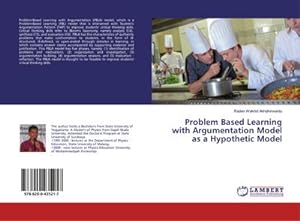Problem Based Learning Argumentation by Akhdinirwanto Raden (4 results)
Search filters
Product Type
- All Product Types
- Books (4)
- Magazines & Periodicals (No further results match this refinement)
- Comics (No further results match this refinement)
- Sheet Music (No further results match this refinement)
- Art, Prints & Posters (No further results match this refinement)
- Photographs (No further results match this refinement)
- Maps (No further results match this refinement)
- Manuscripts & Paper Collectibles (No further results match this refinement)
Condition Learn more
- New (4)
- As New, Fine or Near Fine (No further results match this refinement)
- Very Good or Good (No further results match this refinement)
- Fair or Poor (No further results match this refinement)
- As Described (No further results match this refinement)
Binding
- All Bindings
- Hardcover (No further results match this refinement)
- Softcover (4)
Collectible Attributes
- First Edition (No further results match this refinement)
- Signed (No further results match this refinement)
- Dust Jacket (No further results match this refinement)
- Seller-Supplied Images (4)
- Not Print on Demand (1)
Language (1)
Price
- Any Price
- Under £ 20 (No further results match this refinement)
- £ 20 to £ 35
- Over £ 35 (No further results match this refinement)
Free Shipping
- Free Shipping to U.S.A. (No further results match this refinement)
Seller Location
Seller Rating
-
Problem Based Learning with Argumentation Model as a Hypothetic Model
Published by LAP LAMBERT Academic Publishing Okt 2019, 2019
ISBN 10: 6200435219 ISBN 13: 9786200435217
Language: English
Seller: buchversandmimpf2000, Emtmannsberg, BAYE, Germany
£ 24.11
Convert currency£ 52.20 shipping from Germany to U.S.A.Quantity: 2 available
Add to basketTaschenbuch. Condition: Neu. Neuware -Problem-Based Learning with Argumentation (PBLA) model, which is a Problem-Based Learning (PBL) model that is intervened with Toulmin's Argumentation Pattern (TAP) to improve students' critical thinking skills. Critical thinking skills refer to Bloom's Taxonomy, namely analysis (C4), synthesis (C5), and evaluation (C6). PBLA has the characteristics of authentic problems that make confrontation to students, in the form of ill-structured, ill-defined, or open-ended through stimulus in learning, in which contains answer claims accompanied by supporting evidence and justification. This PBLA model has five phases, namely: (1) identification of problems and motivations, (2) organization and investigation, (3) argumentation building, (4) argumentation sessions, and (5) evaluation - reflection. The PBLA model is thought to be feasible to improve students' critical thinking skills.Books on Demand GmbH, Überseering 33, 22297 Hamburg 56 pp. Englisch.
-
Problem Based Learning with Argumentation Model as a Hypothetic Model
Published by LAP LAMBERT Academic Publishing Okt 2019, 2019
ISBN 10: 6200435219 ISBN 13: 9786200435217
Language: English
Seller: BuchWeltWeit Ludwig Meier e.K., Bergisch Gladbach, Germany
£ 24.11
Convert currency£ 20.01 shipping from Germany to U.S.A.Quantity: 2 available
Add to basketTaschenbuch. Condition: Neu. This item is printed on demand - it takes 3-4 days longer - Neuware -Problem-Based Learning with Argumentation (PBLA) model, which is a Problem-Based Learning (PBL) model that is intervened with Toulmin's Argumentation Pattern (TAP) to improve students' critical thinking skills. Critical thinking skills refer to Bloom's Taxonomy, namely analysis (C4), synthesis (C5), and evaluation (C6). PBLA has the characteristics of authentic problems that make confrontation to students, in the form of ill-structured, ill-defined, or open-ended through stimulus in learning, in which contains answer claims accompanied by supporting evidence and justification. This PBLA model has five phases, namely: (1) identification of problems and motivations, (2) organization and investigation, (3) argumentation building, (4) argumentation sessions, and (5) evaluation - reflection. The PBLA model is thought to be feasible to improve students' critical thinking skills. 56 pp. Englisch.
-
Problem Based Learning with Argumentation Model as a Hypothetic Model
Published by LAP LAMBERT Academic Publishing, 2019
ISBN 10: 6200435219 ISBN 13: 9786200435217
Language: English
Seller: moluna, Greven, Germany
£ 22.01
Convert currency£ 42.62 shipping from Germany to U.S.A.Quantity: Over 20 available
Add to basketCondition: New. Dieser Artikel ist ein Print on Demand Artikel und wird nach Ihrer Bestellung fuer Sie gedruckt. Autor/Autorin: Akhdinirwanto Raden WakhidThe author holds a Bachelor s from State University of Yogyakarta. A Master s of Physics from Gajah Mada University. Attended the Doctoral Program at State University of Surabaya. -1991-2009 - lecturer at th.
-
Problem Based Learning with Argumentation Model as a Hypothetic Model
Published by LAP LAMBERT Academic Publishing, 2019
ISBN 10: 6200435219 ISBN 13: 9786200435217
Language: English
Seller: AHA-BUCH GmbH, Einbeck, Germany
£ 25.89
Convert currency£ 52.64 shipping from Germany to U.S.A.Quantity: 1 available
Add to basketTaschenbuch. Condition: Neu. nach der Bestellung gedruckt Neuware - Printed after ordering - Problem-Based Learning with Argumentation (PBLA) model, which is a Problem-Based Learning (PBL) model that is intervened with Toulmin's Argumentation Pattern (TAP) to improve students' critical thinking skills. Critical thinking skills refer to Bloom's Taxonomy, namely analysis (C4), synthesis (C5), and evaluation (C6). PBLA has the characteristics of authentic problems that make confrontation to students, in the form of ill-structured, ill-defined, or open-ended through stimulus in learning, in which contains answer claims accompanied by supporting evidence and justification. This PBLA model has five phases, namely: (1) identification of problems and motivations, (2) organization and investigation, (3) argumentation building, (4) argumentation sessions, and (5) evaluation - reflection. The PBLA model is thought to be feasible to improve students' critical thinking skills.





